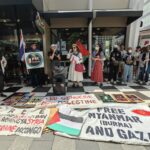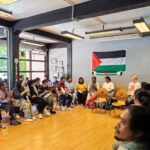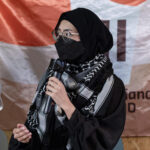For the international peace observers currently holed up within Yasser Arafat’s presidential compound – myself among them – it is not Israeli actions but the inaction of the international community that has most shocked us.
Inside the pock-marked building surrounded by Israeli tanks and snipers, there is one question on everyone’s minds: How many international laws does Israel need to break before the United Nations demands a full and immediate Israeli withdrawal from the West Bank?
The list of violations is reaching unprecedented levels, even for a conflict with a long history of ugly behavior on both sides. Collective punishment is illegal under international law, but Israel has now escalated from interrupting food shipments to shutting off water to the Palestinian city of Ramallah, endangering the lives of 120,000 people. The shelling of Palestinian civilian structures such as power plants, schools and sewage facilities is occurring at an alarming rate. Unarmed civilians are being killed daily.
There are also growing reports of Israeli troops raiding hospitals and firing on ambulances and journalists. These are grave breaches of international conventions.
Anthony Shadid, a correspondent for The Boston Globe, was shot on Sunday as he walked away from an interview in our building. The area, under full Israeli control, was quiet and there was no crossfire. Shadid was wearing the required signs on his back and front indicating that he was with the official press. Soon after he arrived at a hospital, Israeli troops raided it with machine guns drawn. When he was subsequently transferred for further medical treatment, his ambulance came under fire from Israeli soldiers manning a checkpoint.
Israel is making a mockery of the Fourth Geneva Convention, the founding document of international human rights law, and by its tacit acceptance, the United Nations is severely eroding its credibility in the region and beyond.
Those of us inside the presidential compound need help desperately – but not half as much as those on the outside who are facing the full brunt of the mass round-ups and house-to-house raids. The situation cannot deteriorate much further. Medical supplies have run out. Food is scarce.
Pressure from abroad is essential. The presence of international “human shields” throughout the occupied territories has been very important in limiting the indiscriminate nature of Israeli military actions.
Nothing short of a UN demand for a full withdrawal to the 1967 UN recognized borders, however, will succeed in restoring calm and opening the way for peace negotiations. Simply pulling the troops out of the recently invaded regions will not suffice. In the compound we are left wondering, not without fear, whether the international community will allow the permanent expansion of the already illegal occupation and the exile if not assassination of the Palestinian leader.
* Neta Golan, an Israeli, is among the 40 international peace observers occupying Yasser Arafat’s besieged office. This comment, which she wrote with Ian Urbina, an associate editor of the Washington-based magazine Middle East Report, was contributed to the International Herald Tribune.







